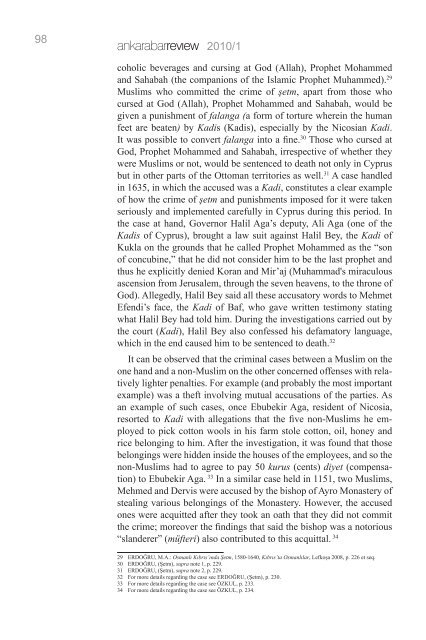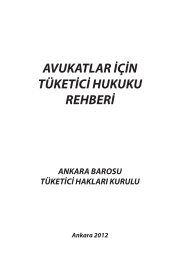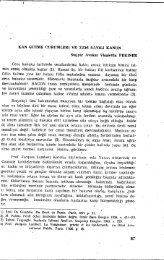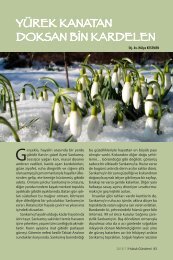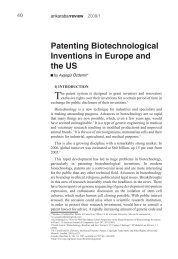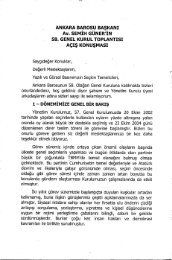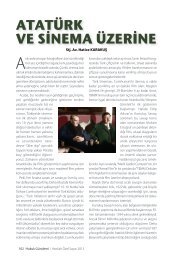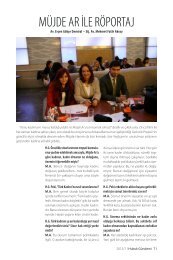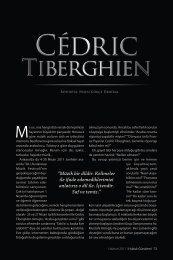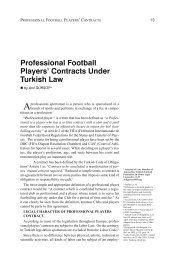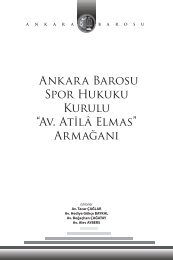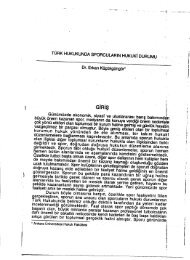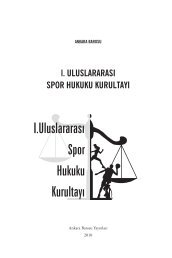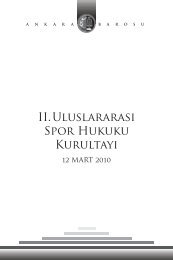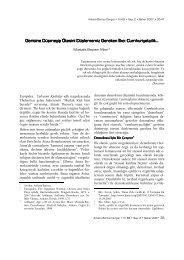The Turkish Cypriot Legal System from a Historical ... - Ankara Barosu
The Turkish Cypriot Legal System from a Historical ... - Ankara Barosu
The Turkish Cypriot Legal System from a Historical ... - Ankara Barosu
You also want an ePaper? Increase the reach of your titles
YUMPU automatically turns print PDFs into web optimized ePapers that Google loves.
98<br />
ankarabarrevıew 2010/1<br />
coholic beverages and cursing at God (Allah), Prophet Mohammed<br />
and Sahabah (the companions of the Islamic Prophet Muhammed). 29<br />
Muslims who committed the crime of şetm, apart <strong>from</strong> those who<br />
cursed at God (Allah), Prophet Mohammed and Sahabah, would be<br />
given a punishment of falanga (a form of torture wherein the human<br />
feet are beaten) by Kadis (Kadis), especially by the Nicosian Kadi.<br />
It was possible to convert falanga into a fine. 30 Those who cursed at<br />
God, Prophet Mohammed and Sahabah, irrespective of whether they<br />
were Muslims or not, would be sentenced to death not only in Cyprus<br />
but in other parts of the Ottoman territories as well. 31 A case handled<br />
in 1635, in which the accused was a Kadi, constitutes a clear example<br />
of how the crime of şetm and punishments imposed for it were taken<br />
seriously and implemented carefully in Cyprus during this period. In<br />
the case at hand, Governor Halil Aga’s deputy, Ali Aga (one of the<br />
Kadis of Cyprus), brought a law suit against Halil Bey, the Kadi of<br />
Kukla on the grounds that he called Prophet Mohammed as the “son<br />
of concubine,” that he did not consider him to be the last prophet and<br />
thus he explicitly denied Koran and Mir’aj (Muhammad's miraculous<br />
ascension <strong>from</strong> Jerusalem, through the seven heavens, to the throne of<br />
God). Allegedly, Halil Bey said all these accusatory words to Mehmet<br />
Efendi’s face, the Kadi of Baf, who gave written testimony stating<br />
what Halil Bey had told him. During the investigations carried out by<br />
the court (Kadi), Halil Bey also confessed his defamatory language,<br />
which in the end caused him to be sentenced to death. 32<br />
It can be observed that the criminal cases between a Muslim on the<br />
one hand and a non-Muslim on the other concerned offenses with relatively<br />
lighter penalties. For example (and probably the most important<br />
example) was a theft involving mutual accusations of the parties. As<br />
an example of such cases, once Ebubekir Aga, resident of Nicosia,<br />
resorted to Kadi with allegations that the five non-Muslims he employed<br />
to pick cotton wools in his farm stole cotton, oil, honey and<br />
rice belonging to him. After the investigation, it was found that those<br />
belongings were hidden inside the houses of the employees, and so the<br />
non-Muslims had to agree to pay 50 kurus (cents) diyet (compensation)<br />
to Ebubekir Aga. 33 In a similar case held in 1151, two Muslims,<br />
Mehmed and Dervis were accused by the bishop of Ayro Monastery of<br />
stealing various belongings of the Monastery. However, the accused<br />
ones were acquitted after they took an oath that they did not commit<br />
the crime; moreover the findings that said the bishop was a notorious<br />
“slanderer” (müfteri) also contributed to this acquittal. 34<br />
29 ERDOĞRU, M.A.: Osmanlı Kıbrıs’ında Şetm, 1580-1640, Kıbrıs’ta Osmanlılar, Lefkoşa 2008, p. 226 et seq.<br />
30 ERDOĞRU, (Şetm), supra note 1, p. 229.<br />
31 ERDOĞRU, (Şetm), supra note 2, p. 229.<br />
32 For more details regarding the case see ERDOĞRU, (Şetm), p. 230.<br />
33 For more details regarding the case see ÖZKUL, p. 233.<br />
34 For more details regarding the case see ÖZKUL, p. 234.


